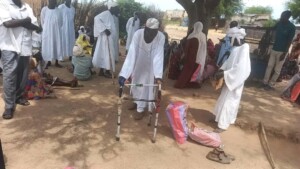Medics: ‘Cholera spreading in Sudan’
According to laboratory results, the diarrhoea cases spreading over various parts of Sudan since September last year are caused by cholera. The Central Committee of Sudanese Doctors reported 53 such cases in Red Sea and El Gezira states on Friday.
According to laboratory results, the diarrhoea cases spreading over various parts of Sudan since September last year are caused by cholera. The Central Committee of Sudanese Doctors reported 53 such cases in Red Sea and El Gezira states on Friday.
Dr Mohamed Naji El Asam, Member of the Doctors' Executive Committee, told Radio Dabanga in an interview broadcast on Friday that the results of laboratory tests on acute diarrhoea samples conducted in the Ahmed Gasim Hospital in Khartoum proved that it was cholera.
The doctor criticised the federal Ministry of Health for keeping silent about the disease in spite of the confirmation by laboratories.
“The management problems at the Health Ministry have impeded containment of the disease. Instead of acknowledging the disease and taking measures to prevent the spread of cholera during the past six months, the authorities opted for not announcing the test results.”
He called on the authorities “to immediately announce the laboratory test results of the Ahmed Gasim Hospital, and take preventive measures to contain the spread of cholera”.
The doctor urged Sudanese people to take care with their personal hygiene, wash vegetables very well, avoid eating outside, get water from clean sources, and do not use water from canals and ditches. “As soon as you suspect that one of your relatives, in particular elderly and children, are hit by cholera, you should immediately transfer them to a hospital, clinic, or health centre.
El Asam said that of the 42 patients stricken with the disease in Port Sudan Hospital, two children died last week.
“There are currently 11 patients in the quarantine department in Wad Madani Hospital in El Gezira state, where six to ten cases are recorded every day,” El Asam said.
“The Ibrahim Malik Hospital in Khartoum received large numbers of people stricken with acute diarrhoea in the past few days.
“As the hospital lacks a quarantine department as well as enough staff to care for all the patients, the authorities advised to transfer them to the Academic Hospital. However this hospital refused to take the patients,” he reported.
The medic attributed the outbreak and spread of the disease to the pollution of drinking water in various parts of the country.
Journalist Osman Hashim, specialised in health cases, reported from Port Sudan that the state government announced taking preventive measures to limit the spread of the deadly disease. “The Port Sudan Hospital prepared two wards for quarantine.
“The Commissioner of Sawakin locality barred the commercial sale of water. The water tankers are only allowed to transport drinking water from the state water reservoirs that have to be purified with chlorine.”
Vibrio Cholera
Cholera is an acute attack of diarrhoea, caused by an infective agent called Vibrio Cholera. Acute watery diarrhoea is most commonly seen with traveller's diarrhoea caused by parasites or food poisoning.
Patients suffering from diarrhoea and cholera feel fatigued, eyes are sunken, and blood pressure is low. Both diarrhoea and cholera result in severe dehydration, and exhaust core nutrients of human body. Patients can also become malnourished during acute attacks of diarrhoea and cholera.
Reports about the spread of ‘watery diarrhoea’ in various parts of Sudan increased during the last quarter of 2016. At least 17 people died of the disease in Blue Nile state in September. A doctor working at the Ed Damazin Hospital in the Blue Nile capital attributed the high prevalence of the disease to the contamination of drinking water, vegetables, and meat.
The federal Health Ministry reported cases in Blue Nile and Kassala in southern and eastern Sudan and River Nile state in northern Sudan in the same month. The first samples of patients were examined for cholera as well.
Since then the deadly disease spread to other localities in eastern and central Sudan.
‘No diarrhoea’
The Health Ministry in Khartoum denied the latest reports about the rapid spread of diarrhoea in central Sudan’s El Gezira two weeks ago. Yet, a spokesman announced that “precautionary procedures have been set to face the cases of acute watery diarrhoea that have recently hit some states”.
In December, a health worker told Radio Dabanga from Wad Madani, capital of El Gezira, that the authorities prohibited the doctors from talking about the disease. He also said that agents of the National Intelligence and Security Service (NISS) confiscated drinking water samples to be checked on contamination in a laboratory in the city.











 and then
and then